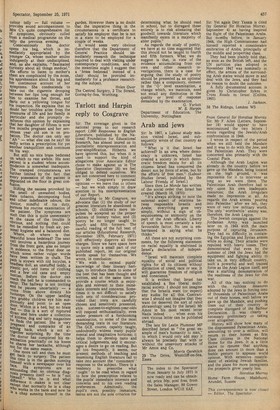Tarlott and Harpin reply to Cosgrave
Sir: The coverage given in the national press to our research report 1,000 Responses to English Literature, published by the National Foundation for Educational Research, has almost inured us to journalistic misrepresentation and over-simplification. Hitherto we have ignored this, but when it is used to support the kind of allegations your Associate Editor chose to make against us in The Spectator (September 18) we feel obliged to defend ourselves. We are not concerned here to comment on Mr Cosgrave's personal opinions — we leave that to others
but we wish simply to draw atention to his misrepresentation of our Report.
According to Mr Cosgrave, we advocate that (1) the study of our greatest literature be abandoned in schools; (2) children's mere impulses be accepted as the proper arbiters of literary value; and (3) poetry be no longer taught to fourth and fifth formers. The careful reading of the full text of our articles (Educational Research, November 1970, February 1971) will effectively disprove all these charges. Since we have space here to quote only a small part of our published report, let our original words speak for themselves. We wrote, in conclusion: "We wish to extend pupils' knowledge of their literary heritage, to introduce them to some of the best that has been thought and written, and at the same time to provide a course which is enjoyable and relevant to their immediate interests and concerns. Sometimes it is not difficult to satisfy both sets of considerations: provided that texts are carefully chosen and sensitively presented, able sixteen-to-eighteen-year-olds will respond enthusiastically, even under pressure of a forthcoming examination, to some of the most demanding texts in our literature. The GCE course, capably taught, undoubtedly widens many pupils' mental and imaginative horizons; it helps them to develop taste and critical judgements, and it encourages a desire to go on reading. But all too frequently, it seems, our present methods of teaching and examining English literature fail to take into account the consumers" response to the subject. There is a tendency to prescribe what 'ought' to be read when in regard to how the prescription relates to the pupils' immediate interests and concerns and to his own reading
preferences. Admittedly, the pupil's own, possibly Immature, tastes are not the sole criterion for determining what he should read in school, but to disregard these entirely is to risk alienating that goodwill towards literature which manifestly exists in a majority of abler pupils."
As regards the study of poetry, we have at no time suggested that this should not be taught to fourth and fifth formers. What we do suggest is that, in view of the evidence accumulating from our own and other research investigations, there is a case for arguing that the study of poetry should be presented as an optional rather than a compulsory, element in the ' 0 ' level examination, a change which, we maintain, need not entail any diminution in the quality or level of response demanded by the examination. G. Yarlott W. S. Harpin Department of Education, The University, Nottingham


































 Previous page
Previous page